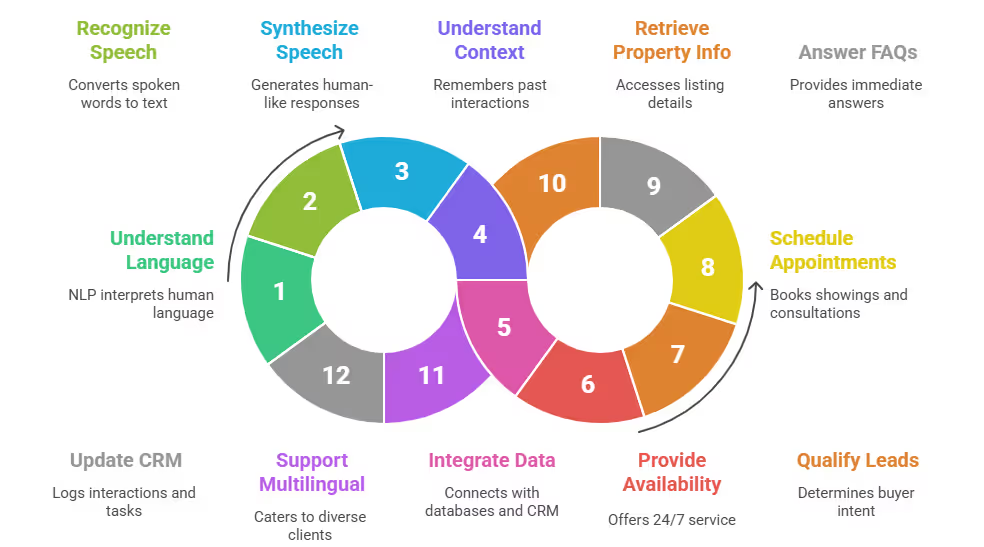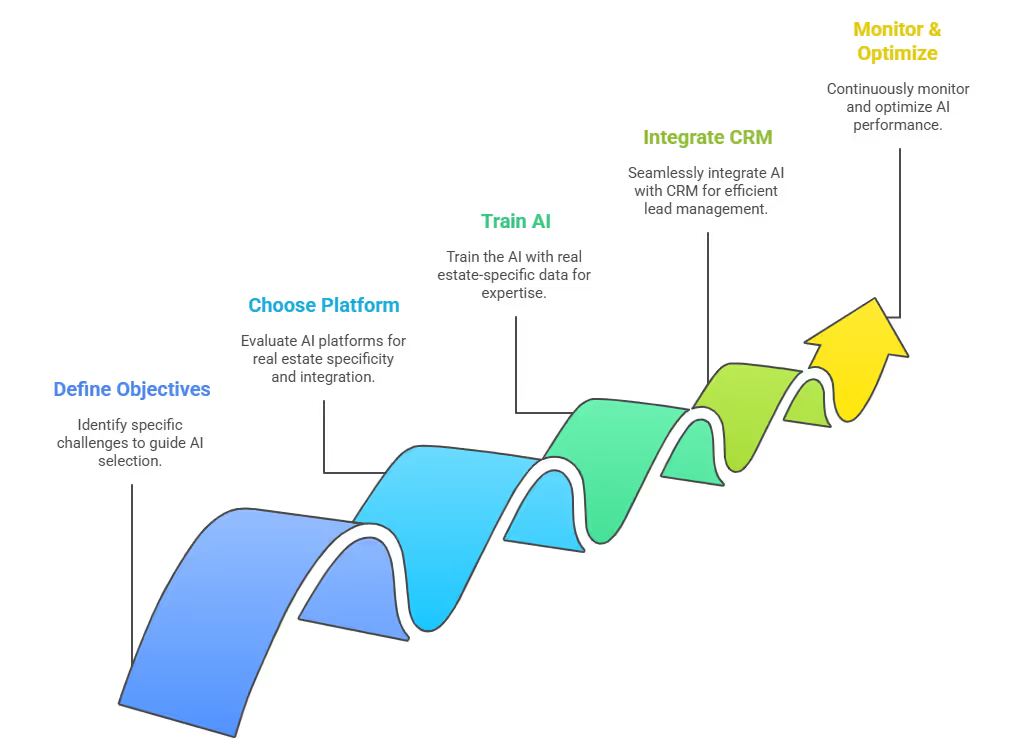AI Voice Agent for Real Estate: Drive Growth with AI

AI Voice Agent for Real Estate: The 2026 Guide for U.S. Real Estate Professionals
In 2026, AI voice agents have become a standard tool in the real estate industry, primarily used to eliminate "missed leads" by providing 24/7 instant response. Unlike traditional IVR systems, these agents use natural language processing (NLP) to conduct fluid, human-like conversations that build trust and qualify prospects before transferring them to human agents.
Top AI Voice Platforms for Real Estate in 2026
Multiple specialized providers offer tailored solutions for the 2026 market:
- Lindy: Best for mid-sized teams; features a no-code drag-and-drop interface to build complex call flows.
- NunarIQ: Offers an AI-powered auto-dialer trained on millions of real estate conversations; features deep CRM integrations with Follow Up Boss and Salesforce.
- Neyox.ai: Purpose-built for instant lead response, often contacting new web leads in under 30 seconds.
- REsimpli: Specialized for real estate investors and wholesalers to handle high volumes of distressed seller calls.
- ElevenLabs: Provides the highest quality, most emotionally realistic voices, often integrated into other platforms for luxury real estate use cases.
- Convin: Notable for its multilingual support and "interruption management," allowing it to handle natural conversation flow and background noise.
Key Capabilities & Use Cases of AI Voice Agents
- Lead Qualification: Agents ask targeted questions about budget, timeline, and pre-approval status to filter serious buyers from "tire-kickers".
- Automated Scheduling: Integrates directly with calendars (e.g., Google, Cal.com) to book property viewings and send instant SMS/email confirmations.
- Outbound Prospecting: Used for "batch calling" expired listings, FSBOs (For Sale By Owner), and old database leads to reactivate them.
- Multilingual Engagement: Many platforms now support 30+ languages, including regional dialects, enabling global reach.
- Property Management: Handles after-hours maintenance requests and rent payment reminders.
2026 Costs and ROI of AI Voice Agents
- Pricing Models:
- Per Minute: Ranges from $0.05 to $0.15 for basic platforms or $0.50 to $1.50 for business-grade solutions.
- Subscriptions: Monthly fees typically range from $50 to $300 plus usage.
- Performance: Agencies using these tools report a 90% reduction in response time and up to a 45% increase in lead conversion. Some firms see an 80% reduction in operational costs compared to human-staffed call centers.
Implementation Steps of AI Voice Agents
- Define Goals: Identify if you need inbound support (answering calls) or outbound (prospecting).
- CRM Integration: Ensure the tool syncs with your CRM (e.g., HubSpot, kvCORE) to log call transcripts and update lead statuses automatically.
- Data Training: Upload your current listings, FAQs, and local neighborhood data to the AI's knowledge base for accurate responses.
- Hybrid Handoff: Set clear "escalation" triggers where the AI transfers the call to a human for complex negotiations or emotional closing.
Stop Losing Leads After Hours, Let AI Voice Agents Answer Every Call, Instantly.
Missed calls are missed deals. Our real estate-trained voice agents qualify leads, answer FAQs, and schedule viewings, 24/7.
Free up your agents, increase response time by 10x, and never miss a hot lead again.
✅ Start with a free lead-handling audit and see where deals are slipping through.
- What Exactly Are AI Voice Agents in Real Estate?
- Impact of AI Voice Agents on U.S. Real Estate
- Top AI Voice Agents for U.S. Real Estate in 2025
- Implementing AI Voice Agents in Real Estate
- The Future of AI Voice Agents in U.S. Real Estate
What Exactly Are AI Voice Agents in Real Estate?
AI voice agents represent a fundamental shift in how real estate professionals communicate with clients. Unlike simple chatbots or IVR systems, these sophisticated AI systems use natural language processing (NLP), speech recognition, and machine learning to conduct human-like conversations over the phone.
They can understand context, recognize emotional cues, and respond appropriately to complex questions about properties, pricing, and procedures, all without human intervention.
Core Components of AI Voice Agents
From our experience developing these systems for U.S. real estate clients, effective AI voice agents combine several crucial technologies:
- Natural Language Processing (NLP): Enables the system to understand and interpret human language, including slang, regional dialects, and industry-specific terminology common in different U.S. markets.
- Speech Recognition and Synthesis: Converts spoken language to text and vice versa, with advanced systems like ElevenLabs providing emotionally expressive voices that sound genuinely human.
- Contextual Understanding: Remembers previous interactions and uses this context to inform current conversations, creating a continuous dialogue experience
- Integration Capabilities: Connects seamlessly with CRM systems, property databases, and calendar applications for real-time data access and updates.
Key Capabilities of AI Voice Agents in Real Estate:
- 24/7 Availability: Never miss a lead or inquiry, regardless of time zones or office hours.
- Intelligent Lead Qualification: Ask targeted questions to determine buyer intent, budget, and preferences.
- Automated Appointment Scheduling: Integrate directly with calendars to book showings, consultations, and follow-ups.
- Instant FAQ Answering: Provide immediate answers to common questions about properties, processes, and market conditions.
- Property Information Retrieval: Access and relay details about listings, including price, features, square footage, and even school districts.
- Multilingual Support: Cater to diverse client bases, particularly important in multicultural U.S. markets like Miami, New York, or California.
- Seamless CRM Integration: Log interactions, update lead statuses, and trigger follow-up tasks automatically.

Imagine Offloading 70% of Your Inbound Calls, Without Hiring a Single Agent.
AI voice agents handle tenant inquiries, property FAQs, showing appointments, and more, instantly and accurately.
Our clients save over 100+ hours a month in call time.
✅ Book a live demo and see how your own listings would sound with an AI voice agent in action.
Impact of AI Voice Agents on U.S. Real Estate
The adoption of AI voice agents in the U.S. real estate market isn't just about technological advancement, it's addressing fundamental pain points that have plagued the industry for decades. According to industry data, the global AI in real estate market is expected to reach $301.58 billion in 2025, growing at a remarkable 35.5% CAGR.
This growth is driven by tangible benefits that directly impact both operational efficiency and customer experience.
1. Revolutionizing Lead Response Times
In real estate, speed isn't just an advantage, it's the determining factor in winning listings and closing deals. Research shows that contacting leads within 30 seconds increases conversion likelihood by 28 times compared to waiting even 5 minutes.
Before AI voice agents, this was impossible for all but the best-staffed brokerages. Now, systems like REsimpli's Speed-To-Lead AI automatically dial new web leads within seconds of form submission, ensuring no opportunity is missed regardless of time or volume.
2. 24/7 Availability Without Staffing Costs
For U.S. real estate professionals, after-hours inquiries have always presented a challenge, miss them and you lose business, but staffing around the clock is prohibitively expensive. AI voice agents solve this dilemma by providing constant availability without the associated payroll costs.
One of our clients, a luxury brokerage in Miami, implemented an AI voice agent to handle after-hours inquiries and saw a 43% increase in qualified appointments from nighttime and weekend leads without adding a single staff member.
3. Enhanced Customer Experience Through Personalization
Modern home buyers and sellers expect personalized experiences tailored to their specific needs and preferences. AI voice agents excel at delivering this personalization at scale by accessing CRM data, property databases, and previous interaction history to conduct context-rich conversations.
For example, when a previous client calls back, the system can reference their last property search, remember their preferred neighborhoods, and even ask about specific concerns they raised previously, creating a seamless experience that builds trust and loyalty.
4. Significant Cost Reduction and ROI
The economics of AI voice agents are compelling for U.S. real estate businesses of all sizes. Traditional inside sales agents (ISAs) cost thousands per month in salary alone, plus benefits, training, and management overhead.
In contrast, AI voice agents typically operate at a fraction of this cost, with most platforms charging between $0.05-$0.15 per minute of conversation.
For a medium-sized brokerage processing 5,000 lead calls monthly, this translates to approximately 80% lower costs compared to human agents handling the same volume.
Implementing AI Voice Agents in Real Estate
Implementing an AI voice agent system in a U.S. real estate business requires careful planning and strategic integration. From selecting the right vendor to training the AI and ensuring smooth CRM integration, each step is crucial for success.

1. Defining Clear Objectives
Before anything else, identify the specific challenges you want the AI voice agent to solve. Are you aiming to improve lead response times, reduce administrative burden, qualify leads more effectively, or provide 24/7 support for a new development in Miami? Clear objectives will guide the selection and implementation process.
2. Choosing the Right AI Voice Platform
The market for AI voice solutions is growing. When evaluating platforms for your U.S. real estate business, consider:
- Real Estate Specificity: Does the platform understand real estate jargon, common questions, and transaction processes?
- Natural Language Understanding (NLU): How sophisticated is its ability to understand varied human speech and intent?
- Integration Capabilities: Can it seamlessly connect with your CRM (e.g., Salesforce, Zoho CRM, Follow Up Boss), calendar systems (e.g., Google Calendar, Outlook), and listing databases (e.g., MLS)?
- Customization and Scalability: Can it be tailored to your specific brand voice and scale with your business growth?
- Security and Compliance: Does it meet data privacy standards, especially important when handling sensitive client information in the U.S.?
3. Training the AI with Real Estate Data
This is where the 'expertise' comes in. The AI needs to be trained on vast amounts of real estate-specific data. This includes:
- Common questions asked by buyers and sellers.
- Property descriptions and features.
- Market terminology and local nuances.
- Your company's specific FAQs and processes.
The more relevant and extensive the training data, the more intelligent and effective your AI voice agent will be. For companies operating in diverse U.S. markets, this might involve regional-specific training sets.
4. Seamless CRM Integration for Real Estate Lead Management
A standalone AI voice agent, while useful, achieves its full potential when integrated with your existing CRM. This ensures that every interaction is logged, every lead is updated, and every appointment is scheduled without manual intervention.
How do AI voice agents integrate with real estate CRM systems? They use APIs to automatically log call details, update lead statuses, add notes from conversations, and trigger follow-up tasks directly within the CRM.
This creates a unified view of the customer journey, allowing human agents to pick up exactly where the AI left off, with full context.
5. Continuous Monitoring and Optimization
Deploying an AI voice agent isn't a one-time event. It requires continuous monitoring, analysis of performance metrics, and ongoing optimization. This involves:
- Reviewing call transcripts and recordings: Identify areas where the AI struggled or where responses could be improved.
- Analyzing lead qualification rates: Adjust the script and questions to refine lead quality.
- Gathering feedback from human agents: Understand how the AI is impacting their workflow and client interactions.
- Updating the AI's knowledge base: Incorporate new listings, market changes, and company policies.
This iterative process ensures the AI voice agent remains a highly effective tool, adapting to the ever-evolving demands of the U.S. real estate market.
The Future of AI Voice Agents in U.S. Real Estate
As AI technology continues advancing at an accelerating pace, voice agents are poised to become even more sophisticated and integral to real estate operations.
Based on current trends and our development roadmap, we see several key developments emerging:
Voice-Activated Property Search
The next evolution will enable clients to simply speak their preferences, "Find me a three-bedroom home in Austin with a pool under $600,000", and have the AI voice agent not only understand the request but conduct the entire search, provide options, and schedule viewings through natural conversation. This represents a shift from reactive response to proactive assistance.
Predictive Client Intent Analysis
Advanced AI systems will increasingly predict client needs before they're explicitly stated by analyzing voice patterns, conversation dynamics, and historical data. By detecting subtle cues in tone and phrasing, these systems will anticipate questions, concerns, and preferences, creating even more personalized and efficient experiences.
Integration with Blockchain and Smart Contracts
As real estate transactions become more digitized, AI voice agents will integrate with blockchain-based transaction systems to handle everything from initial inquiry to closing. Voice authentication will verify identity, while smart contracts will enable secure, automated documentation and payment processing, all coordinated through conversational AI interfaces.
Hyper-Personalized Market Insights
Future AI voice agents will serve as personalized market analysts, providing clients with hyper-localized insights about neighborhoods, schools, transportation, and investment potential, all delivered through natural conversation. These systems will combine property data with live market information to offer recommendations and insights tailored to each client's specific priorities.

